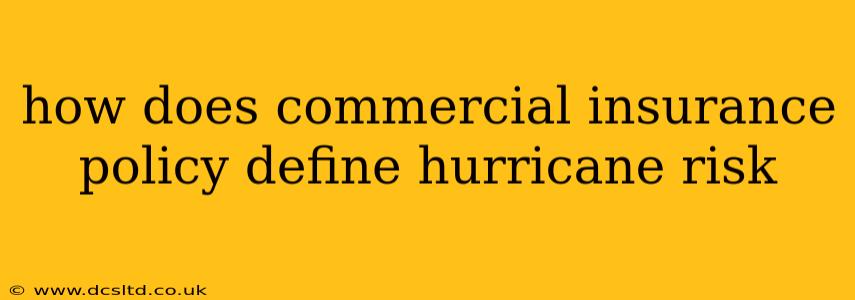How Does a Commercial Insurance Policy Define Hurricane Risk?
Understanding how commercial insurance policies define hurricane risk is crucial for business owners, especially those in coastal areas or regions prone to severe weather. The definition isn't standardized across all insurers, but several key factors consistently influence how hurricane risk is assessed and covered. This complexity necessitates a thorough understanding of your specific policy.
Key Factors Influencing Hurricane Risk Definition in Commercial Insurance:
-
Named Storms vs. Hurricane Force Winds: Policies often distinguish between named storms (tropical storms and hurricanes) and the specific wind speeds that constitute hurricane-force winds (typically 74 mph or higher). Some policies might offer broader coverage for named storms, encompassing damage from high winds, heavy rainfall, and flooding associated with the storm's overall impact. Others may limit coverage to damage caused solely by hurricane-force winds.
-
Wind vs. Water Damage: This is a significant distinction. Wind damage to your building or property is usually covered under most commercial property policies, provided you have the appropriate coverage. However, flood damage—even that resulting from a hurricane's storm surge—typically requires separate flood insurance. Many business owners mistakenly believe that their standard commercial policy covers all hurricane-related damage. This is often not the case.
-
Geographic Location: The specific location of your business plays a major role. Policies in high-risk hurricane zones will generally have higher premiums and potentially stricter definitions of coverage. Insurers use sophisticated models incorporating historical hurricane data, predicted storm tracks, and vulnerability assessments to determine risk.
-
Policy Exclusions and Endorsements: It's essential to review your policy's exclusions carefully. Many policies exclude certain types of damage, even if related to a hurricane. For example, coverage for mold damage following flooding caused by a hurricane might be excluded. Conversely, you can purchase endorsements or riders to expand your coverage. For example, a windstorm endorsement might extend coverage beyond the basic policy's limits for wind-related damage.
-
Specific Perils Covered: Commercial property insurance policies often cover specific named perils, such as wind, hail, and fire. The policy wording will detail precisely what constitutes coverage for a hurricane. This may range from structural damage to business interruption costs.
Understanding the nuances of your policy is paramount. Don't solely rely on the name of your coverage. Read the entire policy document meticulously, or consult with your insurance broker or agent for clarification.
Frequently Asked Questions (PAA):
1. What is the difference between a named storm and a hurricane in the context of commercial insurance?
The distinction lies in wind speed. A named storm is a tropical storm or hurricane that's officially named by meteorological agencies. However, only when winds reach hurricane force (74 mph or higher) does the damage fall under the strictest definition of "hurricane damage" in many policies. Some policies offer broader coverage for named storms, covering damage from high winds regardless of the exact wind speed, while others limit coverage to hurricane-force winds.
2. Does my commercial property insurance cover flood damage from a hurricane?
Typically, no. Flood damage, even if caused by a hurricane’s storm surge, usually requires a separate flood insurance policy. Your standard commercial property insurance policy likely covers wind and other related damage but explicitly excludes flood-related losses.
3. How do insurance companies determine the hurricane risk for my business?
Insurers use a variety of factors, including your business's location (proximity to the coast, elevation), the historical frequency and intensity of hurricanes in that area, building construction type and quality, and sophisticated modeling techniques that project future hurricane risk. Risk assessment significantly influences your premium.
4. What are some common exclusions in commercial insurance policies related to hurricanes?
Common exclusions may include mold damage following water damage from a hurricane, gradual damage (not directly caused by the hurricane's immediate impact), and specific types of damage to certain equipment or property. Always carefully review your policy's exclusions.
5. Can I add coverage for hurricane damage to my existing policy?
Yes. You can usually purchase endorsements or riders to add or expand coverage for specific hurricane-related damages. Consulting with your insurance agent is crucial to understanding available options and customizing your coverage to your business's needs. This might include broadening your wind coverage, adding flood insurance, or increasing your coverage limits for business interruption.
Disclaimer: This information is for general knowledge and understanding only and should not be considered professional insurance advice. It's crucial to consult with your insurance broker or agent for accurate interpretation of your specific policy and to address any questions regarding hurricane coverage.
